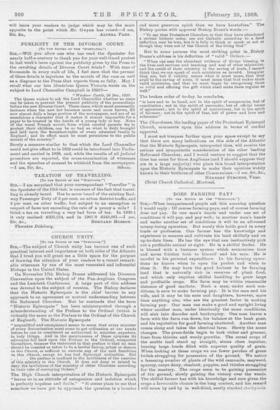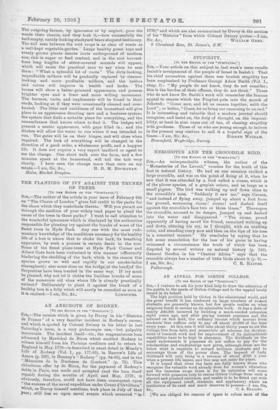DOES FARMING PAY?
[To TUB EDITOR OF THR " SPRCIATOR."] Sin,—When inexperienced people ask this amazing question I would reply : Of course farming pays, and of course farming does not pay. In one man's hands and under one set of conditions it will pay, and pay well ; in another man's hands and under another set of conditions it will be an all-round money-losing operation. But surely this holds good in every trade or profession. One farmer has the knowledge and experience to manure and cultivate his land skilfully and on up-to-date lines. He has the eye that can instinctively pick out a profitable animal at sight. He is a skilful feeder. He is blessed with a business system which economises time and saves friction both to himself and his men. He is careful in his personal expenditure. In his farming opera- tions he knows when to open his pocket and when to close it. He may have the good fortune to be fanning land that is naturally rich in reserves of plant food, and which only requires skilful handling to grow large and profitable crops. His farm may he within reasonable distance of good markets. Such a man, under such con- ditions, is sure to make farming pay. It is the man and his wife, and it may be his sons and daughters, however, more than anything else, who are the greatest factor in making farming pay. One man can make a good and upright living where another man, under identically the same conditions, will sink into disorder and bankruptcy. One man leaves a farm with the farm run down, his balance at the bank gone, and his reputation for good farming shattered. Another man comes along and takes the identical farm. Slowly the scene changes. The grass-fields begin to look richer and greener, freer from thistles and weedy growths. The cereal crops of the arable land stand up straight, stems close together, bearing large .heads filled with superior quality of grain. When looking at these orops we see fewer patches of green twitch struggling for possession of the ground. We notice a lessening number of plants of the wild camomile, mayweed, spurrey, oxeye daisy, charlock, poppies, and thistles struggling for the mastery. The crops seem to be gaining possession of the ground, slowly gaining the victory over the weeds. The skilful farmer has with his knowledge and care given the crops a favourable chance in the long contest, and his reward will cows by and by in well-filled, neatly stacked t;t:lelcyards. The outgoing farmer, by ignorance or by neglect, gave the weeds their chance, and they took it,—how successfully the half-empty, untidy-looking staokyard bears eloquent testimony. The soil seen between the root crops is as clear of weeds as a well-kept vegetable-garden. Large healthy green tops and evenly grown plants denote roots underground of medium size, rich in sugar or feed content, and in the root harvest- time long lengths of straw-covered mounds will appear, which will cause the practical man to say when he sees them " What a splendid lot of roots." The dirty-looking, unprofitable milkers will be gradually replaced by cleaner- looking and more profitable milkers, and the heifers and calves will improve in health and looks. The horses will show a better-groomed appearance, and possess brighter eyes and a freer and more willing movement. The harness, carts, and implements will be found in their sheds, looking as if they were occasionally cleaned and over- hauled. The litter and untidiness of the homestead will give place to an appearance denoting care and a business system, the system that finds a suitable place for everything, and the remembrance that knows where to find it. The hedges will present a neater appearance, with gape filled in; and the ditches will allow the water to run where it was intended to run. The gates will be on their hinges, and will close when required. The look of everything will be changed in the direction of a good order, a wholesome profit, and a happier life. It does not require a very expert landlord or agent to See the change. One short walk over the farm, and a few minutes spent at the homestead, will tell the tale very clearly. I have seen the change more than once on my











































 Previous page
Previous page